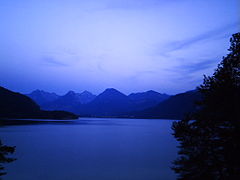Abendzauber (Evening magic), WAB 57, is a song composed by Anton Bruckner in 1878.
| Abendzauber | |
|---|---|
| Secular choral workbyAnton Bruckner | |

The Wolfgangsee in the evening
| |
| Key | G-flat major |
| Catalogue | WAB57 |
| Text | Heinrich von der Mattig |
| Language | German |
| Composed | 13 January 1878 (1878-01-13): Vienna |
| Dedication | Carl Almeroth |
| Published | 1911 (1911): Vienna |
| Vocal | TTBB choir, "yodelers", and tenor or baritone soloist |
| Instrumental | Four horns |
Bruckner composed the song on a text of Heinrich von der Mattig on 13 January 1878. He dedicated it to Carl Almeroth. The piece was not performed during the composer's life, because of its performance difficulties (humming voices). It was first performed in 1911 by Viktor Keldorfer with the Wiener Männergesang-Verein (Vienna men's choral association), and was thereafter published by the Universal Edition.[1] It was very popular with Austrian choirs during the interbellum.
The work, of which the original manuscript is stored in the archive of the Wiener Männergesang-Verein,[1] is issued in Band XXIII/2, No. 29 of the Gesamtausgabe.[2]
Abendzauber uses a text by Heinrich von der Mattig.
Der See träumt zwischen Felsen, |
The lake dreams between rocks, |
The 82-bar long work in G-flat major is scored for TTBB choir, tenor or baritone soloist. Similarly to Das hohe Lied, the first part (58 bars) is sung by the soloist with an accompaniment of humming voices. From "Wer könnte je vergessen", the melody is taken over by the choir. In addition, four horns are figuring Alphorns, and a Ferngesang (chant from a distance) of female voices is figuring yodelers.[1]
The song, which is in the line of Mitternacht, WAB 80, and the two settings of Um Mitternacht (WAB 89 and 90), is a remarkable example of nature imagery.[3] Bruckner's specialist Ernst Kurth considers this original, somewhat odd piece as one Bruckner's most romantic works.[1]
The first recording of Abendzauber was by Bryan Fairfax, with Alfred Orda (tenor), the BBC Chorus and the horns of the London Symphony Orchestra, Szymanowski - Bruckner - Schumann. A Choral Anthology – CD: Symposium Records 1423 (4 September 1960)
A selection of the few other recordings: